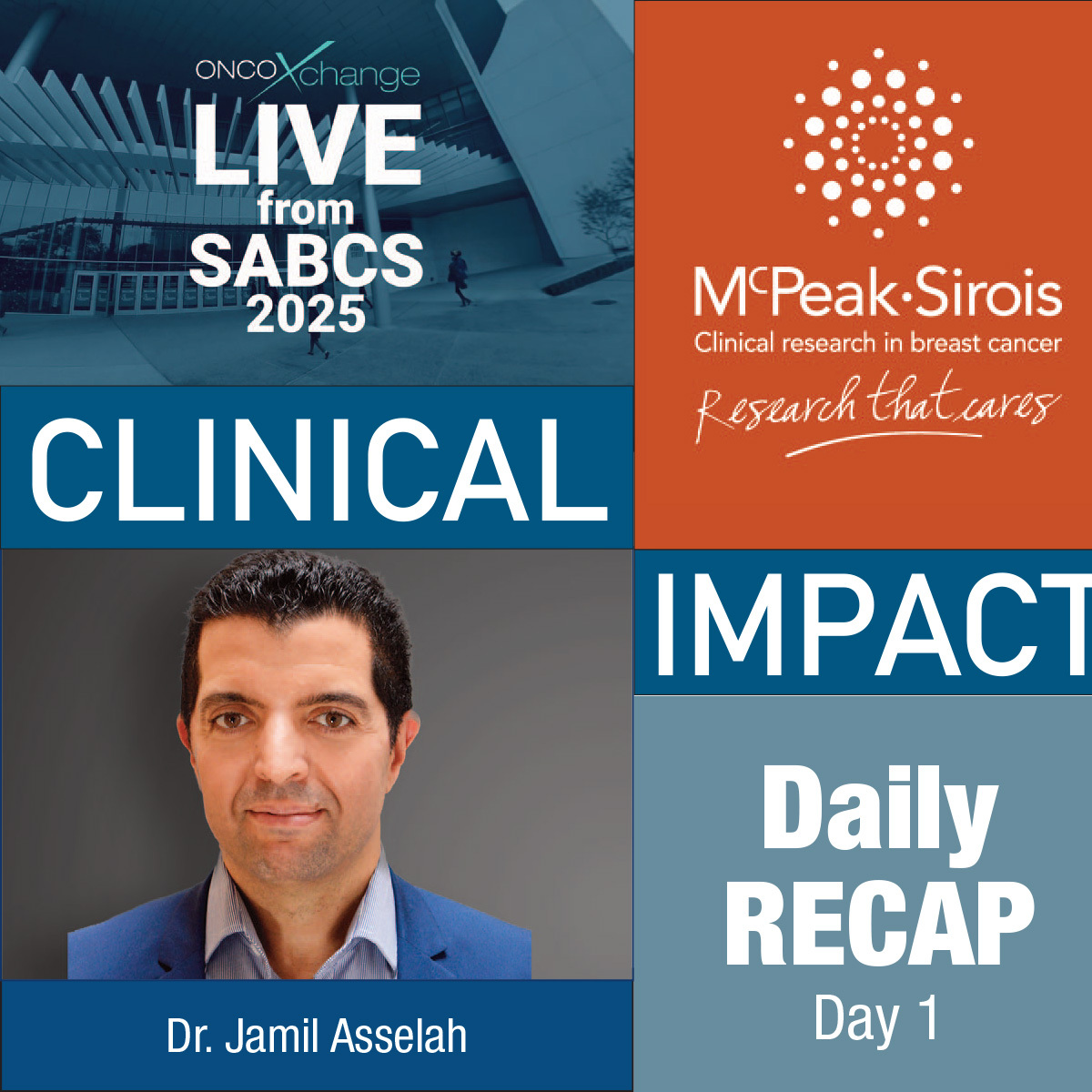
ASCO 2024 - Abemaciclib After Progression on Prior CDK4/6 Inhibition Improved PFS in HR+/HER2- Advanced Breast Cancer
June 2024
By Wayne Kuznar for oncoXchange
Abemaciclib improved progression-free survival (PFS) in patients with HR+/HER2- advanced breast cancer that had progressed on prior CDK4/6 inhibition plus endocrine therapy. In the postMONARCH study, abemaciclib added to fulvestrant reduced the risk of developing a PFS event by 27% compared with placebo plus fulvestrant (HR, 0.73; 95% CI, 0.57-0.95; P=0.02), reported Kevin Kalinsky, MD, MS, at the American Society of Clinical Oncology (ASCO) annual meeting.
Thus, abemaciclib plus fulvestrant offers a targeted therapy option after disease progression for this group of patients..
“postMONARCH is the first Phase 3 randomized, placebo-controlled trial to show benefit of continuing a CDK4/6 inhibitor with abemaciclib plus fulvestrant, following progression on a CDK4/6 inhibitor, said Prof. Kalinsky, MD, from Winship Cancer Institute of Emory University, Atlanta.
The PFS benefit with abemaciclib post-progression was observed across multiple prespecified and clinically relevant subgroups, including key biomarker subgroups.
There was also consistent improvement across key secondary efficacy endpoints, including PFS by blinded independent central review (BICR).
The combination of a CDK4/6 inhibitor plus ET is standard first-line treatment of HR+/HER2- advanced breast cancer. Abemaciclib is an oral, potent CDK4/6 inhibitor with greater selectivity for CDK4 than CDK6, which allows continuous dosing due to less myelosuppression.
Abemaciclib is approved as monotherapy in the advanced setting as well as in combination with ET (aromatase inhibitor or fulvestrant) in the advanced setting in high-risk early-stage breast cancer.
Randomized Phase 2 trials of continuing CDK4/6 inhibition after progression on a CDK4/6 inhibitor and switching ET have demonstrated inconsistent benefit, said Prof. Kalinsky.
“Recent approvals of targeted therapy after front-line CDK4/6 inhibition have been limited to biomarker-positive disease, including those with PI3K pathway alterations and those with ESR1 mutations,” he continued. “Despite this important progress, median PFS with these agents in biomarker-positive advanced breast cancer remains <6 months, absolute improvement is generally limited to one to two scan intervals, and toxicities vary. In these studies, prior chemotherapy in the advanced setting was allowed.”
Need for targeted therapies in this setting
In this general context, there remains a need for targeted therapies post first-line CDK4/6 inhibition, including in the biomarker-negative population.
PostMONARCH is a randomized Phase 3 trial conducted at 96 centers in 16 countries. It included patients with HR+/HER2-negative advanced disease. Prior therapy could include either a CDK4/6 inhibition plus an aromatase inhibitor as initial therapy in the advanced setting or with disease recurrence on or after CDK4/6 inhibition plus ET. No other therapy for advanced disease was allowed, including no prior chemotherapy or selective estrogen receptor downregulators in the advanced setting.
Patients were randomly assigned 1:1 to abemaciclib plus fulvestrant or placebo plus fulvestrant. The primary endpoint was investigator-assessed PFS. Scans were performed every 8 weeks for the first 12 months, then every 12 weeks.
Patient and disease characteristics were well balanced between arms. Approximately 60% of patients had visceral metastases, about 38% had liver metastases, and about 20% had bone only metastases.
Almost all patients received a prior CDK4/6 inhibitor in the advanced setting: 60% received prior palbociclib, one third received prior ribociclib, and 8% had prior abemaciclib. The median duration of prior CDK4/6 inhibition was 19 months in the abemaciclib plus fulvestrant arm and 21 months in the placebo plus fulvestrant arm.
In the primary analysis, abemaciclib improved investigator-assessed PFS, from a median of 5.3 months to 6.0 months, corresponding to a 27% reduction in the risk of a PFS event (HR, 0.73; P=0.02). The 6-month PFS rates were 50% and 37% in the experimental and placebo arms, respectively.
Abemaciclib also led to a 45% reduction in the risk of a PFS event by BICR, with median PFS of 12.9 months in the abemaciclib plus fulvestrant arm versus 5.6 months in the placebo plus fulvestrant arm (HR, 0.55; P=0.0004).
In an exploratory analysis, consistent benefit with abemaciclib was observed regardless of the presence or absence of ESR1 mutations and PIK3CA pathway alterations.
A prespecified subgroup analysis of PFS by prior duration of CDK4/6 inhibition was conducted, and showed that the greatest benefit to abemacicliob was observed in patients who received prolonged benefit with CDK4/6 inhibition and ET in the first-line setting.
Among patients who were on a prior CDK4/6 inhibitor for <12 months, investigator-assessed PFS was a median of 5.5 months with abemaciclib compared with 3.0 months in the placebo group (HR, 0.80; (5% CI, 0.50-1.29).
Among those patients on prior CDK4/6 inhibition for ≥12 months, the rates were 7.0 versus 5.4 months, respectively (HR, 0.70; 95% CI 0.52-0.94).
Patients with and without visceral metastases both benefited from the addition ofabemaciclib to fulvestrant.
Overall survival data are immature. Safety was consistent with the known profile of abemaciclib.
Switching trial
Invited discussant Ruth O’Regan, MD, from the University of Rochester, New York, said that postMONARCH constitutes a “switching” study in that most patients on prior CDK4/6 inhibition received palbociclib. From this, she concluded that “switching CDK4/6 inhibtir at progression is an option for patients in the second-line and greater setting, especially in the absence of a targetable mutation.”

Comments (0)